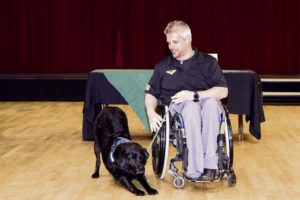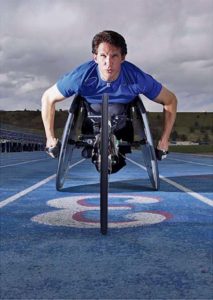by Airman 1st Class Kristof J. Rixmann
86th Airlift Wing Public Affairs
Retired Staff Sgt. Jason Morgan shared his uplifting story with active-duty servicemembers on Ramstein Air Base, April 3.
Morgan was the guest speaker during a resiliency event organized by U.S. Air Force Col. John P. Zapata, 86th Mission Support Group commander, and Technical Sgt. Destini Yaden, Deployment Transition Center resiliency technician.
In 1999, Morgan was thrown from his vehicle after it careened off a cliff during a counter narcotics mission in South America. The vehicle rolled over Morgan and caused life-threatening injuries, including a debilitating spinal cord injury.
Morgan, a Texas native, would spend half of the next seven years recovering in the hospital, unsure if he would ever be well again.
“I spent 11 months in my last trip to the hospital without so much as going outside,” said Morgan. “I grew frustrated as doctors told me I’d never walk again, and really, I got tired of people telling me I couldn’t do stuff. I felt like I lost my sense of purpose.”

Morgan believes the staggering 22 U.S. veteran suicides per day is closely tied to the individual’s lost sense of purpose in life. Morgan said he knew he had to find purpose in his life again.
“Well, first and foremost, I found a great sense of purpose in my two boys,” said Morgan. “I had to relearn how to be a father because now I’m in a wheelchair. For a while I couldn’t do many things other fathers and sons get to do so I had to find other ways.”
Morgan discovered by tapping into his competitive spirit he would not only further his sense of purpose but also serve as a source of inspiration for his two children.
Despite being paralyzed from the waist down, Morgan began swimming, snow skiing and whitewater rafting. Morgan would also become a regular competitor and medalist in the U.S. Warrior Games, a joint-force, Olympic-style competition open to wounded, ill and injured U.S. military members and veterans.
He didn’t stop there.
“As I was competing for the Warrior Games, a great organization asked to sponsor me in the next Marine Corp Marathon,” said Morgan. “One of the things on my bucket list was to always do a marathon. In my unit we had a saying that you had to run 30 miles on your 30th birthday. I was hurt when I was 29. So, I told my unit when I turn 40 I’ll do a marathon. I thought I would but before I knew it my 40th birthday came and went. So, when this organization came to me I realized I could finally do this marathon I’ve always wanted to do.”
Morgan trained for the next five months; exercising every day.
“I was really excited,” said Morgan. “I was averaging a seven and a half minute mile and was on track for a sub-three hour marathon. I felt great throughout my training. Well, about six weeks out from the marathon I had a blister on my heel. In a matter of hours my entire ankle swelled and so I immediately went to the Emergency Room. I knew something was definitely wrong.”
Doctors informed Morgan he had an infection in his bone. They assured him, however, the operation would be non-invasive and predicted no more than a one night stay in the hospital.
Morgan was relieved by the news as the marathon was around the corner and feared missing out on additional training.
He received an MRI and returned to the hospital three days later for the results.
“So, the doctor came back into the room and said ‘I don’t really know how to tell you this but I think our best bet is to amputate your leg. It’s a lot worse than we thought,’” said Morgan. “When he said that I couldn’t believe it. Things were going good. I was getting ready to do this marathon. I actually started walking on long-legged braces which the doctors said I would never be able to do. My kids were doing great and I felt like I had everything in my life together. All I could say was, ‘are you serious?’”
Doctors told him they could attempt to save the leg but the odds of a successful surgery left them skeptical. If, by chance, the surgery was even successful the recovery would result in an additional year spent in the hospital.
Morgan was given ten minutes to make an unequivocal life-changing decision.
Fortunately his service dog, Nepal, sensed the anxiety Morgan experienced with this decision.
“When you have a dog, I have my dog with me 24/7, you definitely can learn how to read each other,” said Morgan. “I didn’t even give him the command but he kind of just went up on my lap. He can sense whenever I’m hurt or sad.”
In that moment Nepal gave Morgan a sense of relief and a moment to think clearly.
I knew at that time the decision I had to make wasn’t really whether or not I keep my leg,” said Morgan. “I didn’t want to take a chance on losing my life, as others have with bone infections, nor do I want to spend another year in the hospital. Those days are behind me. Really, the question I had to ask myself was am I going to go back to that dark place I was in when I first became paralyzed and live that life, or allow them to take my leg and continue to live out my dream and complete this marathon.”
The answer was clear to Morgan. He informed the doctor he wanted the leg amputated the next day because he had a marathon to compete in.
Following the amputation, Morgan went through intense physical rehabilitation sessions led by a team of physical therapists that knew how important this marathon was to him.
Weeks later, Morgan endured 45 mile-per-hour winds and heavy rain in the midst of Hurricane Sandy before crossing the finish line of the Marine Corp Marathon in Washington, D.C.
In good humor, Morgan recalls a moment during the race.

Morgan continues to train, is scheduled to race a full marathon and plans to join the U.S. Paralympics team in the future. “out of anything I’ve done, this has been the greatest thing for me,” he said. “This event has made me feel like a part of the Air Force again.”
“I remember at one point during the race I was going uphill and into the wind,” said Morgan. “I’m going as hard as I can and out of the corner of my eye I see this five-year-old kid walking faster than I was pushing. He was giving me that look like, ‘Oh yeah, keep it up there buddy. You’re doin’ good.’ It was kind of frustrating but I did catch him on the downhill, I promise you that.”
Morgan said he couldn’t help but think how different he can live his life knowing he completed what he set out to do against such incredible odds. Completing the marathon was a huge boost in his life, he said.
Morgan believes one of the biggest compliments he’s received is when his son, U.S. Air Force Airman 1st Class Grant Morgan, 82nd Security Forces Squadron entry controller, followed in his footsteps by enlisting in the U.S. Air Force two years ago.
“There was an article written about my son he showed me recently,” said Morgan. “I couldn’t help but get teary-eyed when I saw at the end there was a quote by him which read, ‘I just want to pick up where my dad left off.’ To hear those words from him I just thought to myself, ‘You know what? I did do it right.’”
In the final moments of his speech during this resiliency event, Morgan had a message for his audience.
“It’s amazing, this country that we live in. I’m so grateful to live in a country where we’re appreciated for our service. Don’t take it for granted. We’re in the best military in the world because we live in the best country in the world.”


